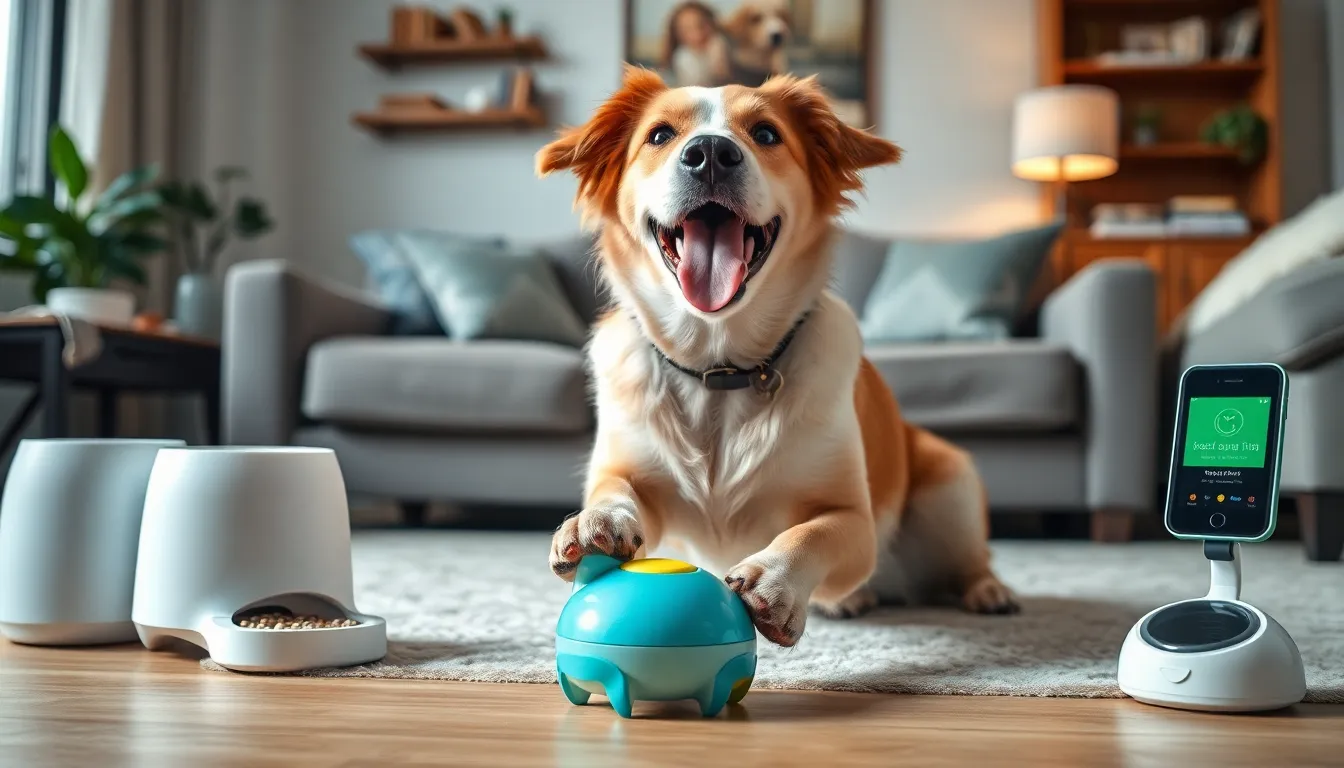Table of Contents
ToggleIn a world where technology seamlessly integrates into daily life, pet care is no exception. Smart pet care solutions are revolutionizing how pet owners monitor and nurture their furry companions. From automated feeders to health tracking devices, these innovations simplify pet management and enhance the well-being of pets.
Imagine being able to check on your pet’s activity levels or feeding schedule right from your smartphone. Smart pet care tools not only provide convenience but also peace of mind, ensuring pets receive the attention they need even when owners are away. As the demand for smarter living grows, understanding these technologies becomes essential for every pet parent looking to improve their pet’s life.
Overview of Smart Pet Care
Smart pet care integrates technology to enhance pet management and improve the quality of life for pets. This category of pet care includes devices and applications designed to monitor and assist in daily pet activities. Automated feeders serve as a primary example, allowing pet owners to schedule meals and portions from a smartphone. Health tracking devices also play a vital role by monitoring pets’ activity levels, sleep patterns, and overall health metrics.
Smart pet care solutions enable real-time insights into pets’ behaviors and habits. They help in identifying irregularities that may signal health issues. Pet owners receive notifications about their pets’ activities, ensuring they remain informed about their well-being. These advancements offer convenience and facilitate remote care for pets, assuring owners that their furry companions receive adequate attention even when they’re away.
Innovations in smart pet care enhance the relationship between pets and their owners. They foster engagement through features such as interactive toys that stimulate pets mentally and physically. Moreover, smart cameras allow pet owners to check on their pets at home, providing reassurance and enabling interaction during separation periods. With these technological advancements, the landscape of pet care continues to evolve, making it more user-friendly and efficient for owners while promoting pets’ health and happiness.
Benefits of Smart Pet Care

Smart pet care solutions provide significant advantages for both pets and their owners. These innovations streamline daily pet management and enhance overall pet well-being.
Enhanced Convenience
Smart pet care devices simplify various aspects of pet ownership. Automated feeders allow for precise scheduling of meals, ensuring pets receive the right food portions at the appropriate times. Smart cameras enable owners to monitor their pets remotely, allowing for peace of mind during absences. Additionally, pet care apps facilitate scheduling veterinary appointments and medication reminders, ensuring that pet owners take timely actions without the stress of remembering every detail. Overall, these technologies maximize convenience and allow owners to stay connected with their pets with ease.
Improved Pet Health
Smart pet care contributes directly to better health outcomes for pets. Health tracking devices monitor vital signs and activity levels, providing real-time insights into a pet’s well-being. This data helps owners make informed decisions regarding exercise needs and potential health issues, leading to earlier intervention when necessary. Furthermore, automated toys stimulate mental engagement, reducing anxiety and boredom while promoting physical activity. By leveraging technology, smart pet care fosters a proactive approach to maintaining a pet’s health and happiness.
Types of Smart Pet Care Products
Smart pet care products enhance the relationship between owners and their pets by integrating technology into daily routines. Key categories of these products include smart feeders, GPS trackers, and interactive cameras.
Smart Feeders
Smart feeders provide automated meal scheduling and portion control. They allow owners to set specific feeding times and quantities through smartphone apps. For example, some models can store multiple meals and dispense food at predetermined intervals, ensuring pets receive consistent nutrition. Smart feeders can also send notifications when food levels are low, helping maintain healthy eating habits.
GPS Trackers
GPS trackers offer real-time location tracking for pets. These devices attach to collars and connect to mobile applications, enabling owners to monitor their pets’ movements and receive alerts if they wander outside designated areas. Some models include activity monitoring, helping owners understand their pets’ exercise needs. Advanced GPS trackers provide geofencing features, creating safe zones and sending alerts when pets leave these predefined boundaries.
Interactive Cameras
Interactive cameras enable remote monitoring and interaction with pets. These cameras often come equipped with two-way audio and video capabilities, allowing owners to see and communicate with their pets in real-time through their smartphones. Many models include treat dispensers, enabling owners to reward their pets while away from home. Smart cameras also feature motion detection, sending notifications when movement is detected, which enhances home security and pet welfare.
Choosing the Right Smart Pet Care Solution
Selecting the appropriate smart pet care solution involves assessing specific pet needs and financial considerations. Making informed decisions ensures optimal care and effective use of technology.
Consider Your Pet’s Needs
Evaluating a pet’s unique requirements is crucial when choosing smart pet care solutions. These considerations include the pet’s age, health conditions, and activity levels.
- Age: Puppies and kittens might benefit from feeding schedules that promote development, while older pets may require health monitoring devices to detect early signs of illness.
- Health Conditions: Pets with specific health issues, such as diabetes or arthritis, need feeding solutions that accommodate dietary restrictions and activity monitoring for overall wellness.
- Activity Level: Highly active pets may thrive with GPS trackers and interactive toys that promote engagement and exercise, while less active pets might focus more on health monitoring and feeding management.
Budget Considerations
Budget plays a significant role in selecting smart pet care tools. Factors affecting the total cost include the device’s initial price, ongoing subscriptions for features, and potential maintenance expenses.
- Initial Investment: Basic smart feeders or GPS trackers typically range from $50 to $150, while more advanced devices may exceed $200.
- Subscription Fees: Some smart devices offer premium features requiring monthly or annual subscriptions. Assessing these costs upfront ensures no surprises later on.
- Long-term Savings: Investing in smart pet care tools can lead to savings on veterinary expenses through proactive health monitoring, making upfront costs more manageable over time.
Smart pet care is revolutionizing how owners interact with and manage their pets. By integrating technology into daily routines, pet owners gain valuable insights into their pets’ health and behavior. This not only enhances convenience but also fosters a deeper bond between pets and their owners.
Choosing the right smart pet care solution is crucial for maximizing benefits. By considering individual pet needs and budget constraints, owners can select devices that truly enhance their pets’ quality of life. As technology continues to advance, the future of pet care promises even greater innovations that will further enrich the lives of pets and their families. Embracing these tools leads to happier, healthier pets and more relaxed owners.





